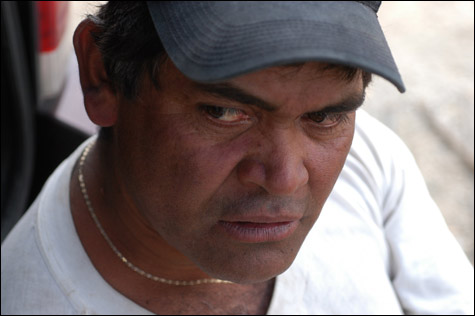
In the Pit |
They’re called “festival films,” movies that resonate with the serious, eager-minded who attend fests but have little chance in the Darwinian world of theatrical release. And yet, once in a blue luna, an appealing little work squeezes through. In the Pit, which opens this Friday at the Kendall Square, is Juan Carlos Rulfo’s plotless, Spanish-language documentary sketch of a band of hard-hat workers who’re constructing a patch of a monumental freeway encircling Mexico City. Instead of an Egyptian pyramid, they’re building the architecturally famous Second Deck, miles and miles and miles and miles of elevated road, a somewhere to deposit Mexico City’s gnarl of three million vehicles.
The guys could be at any construction site in the world, except perhaps for their lousy, non-union pay, about $5 a day for climbing frighteningly high in the air and tunneling dangerously low. Rulfo jumps from worker to worker, providing mini-portraits, as they converse with the camera while they toil. Two stand out a bit. There’s the good-natured, non-ambitious Chabelo, who remains unruffled as his peers keep pressing him to take a bath. There’s José, a dimpled, turn-on-the-charm ladies’ man who, he admits, has seen better times, when he had rolls of money and ample coke and was employed by the mob. The more time spent with José, the less appealing his veneer. In fact, he loses it all when he blurts out the effects of his temper: a girlfriend who couldn’t open her left eye after he put his fist in it.
But most of the compañeros are harmless guys with regular dreams of a better life, like the crew foreman, Vicencio, who wants to retire to a farm and his horses. The most touching scene is the simplest. Salvador has accumulated a bit of money, and he manages to buy a modest, tiny house. For the benefit of the camera crew, he gives a tour: the kitchen, the living room, the two bedrooms, one for his daughter, and even a guest room, if someone should sleep over. He can hardly believe all this is his; it’s as if he were showing off Versailles.
The Brattle Theatre is brave in offering a “Perspectives on World War II series” April 5-11. Who’s sure to attend apart from veterans of the Battle of the Bulge? But look closely at the superb schedule. You can see 2006’s best American movies, Flags of Our Fathers and Letters from Iwo Jima, together on the big screen April 6 and 7. Other movies are grandly entertaining for any audience, starting April 5 with Billy Wilder’s rarely exhibited black comedy A Foreign Affair (1948).
For this one, Austrian-Jewish émigré Wilder returned to Berlin, where he’d lived and worked, to get his cinematic revenge against the defeated Germans. He’s there with his camera showing the symphony of a city of rubble, where the populace is suffering and the black market reigns. We get a gallows-humor tour: “That’s the balcony where Hitler promised the Third Reich would last a thousand years. He broke the heart of the bookies.” And he brings back to Berlin Marlene Dietrich, who’d fled the city and supported the Allies in the War, to play a Leni Riefenstahl show-biz type in denial of being bedded by, and embedded with, the Nazis.